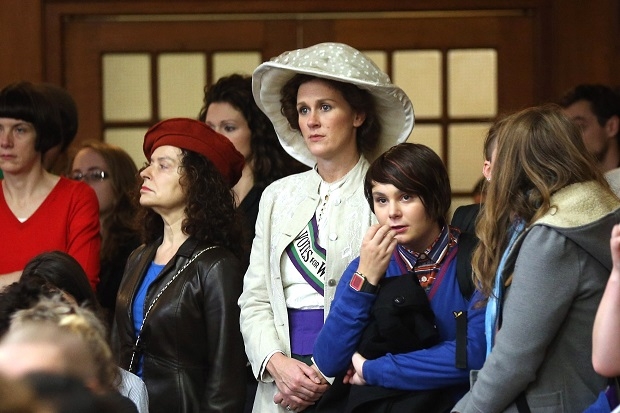A few years back I did one of those online debates on the Times website, the subject being why feminism had fallen out of favour. Within about 60 seconds four people had used the phrase ‘gender is a social construct’ and, well, I sort of switched off at that point.
It’s strange that the F-word is now so unpopular that even David Cameron, a man with a desperately keen ear for metro-liberal opinion, refused to identify as such last week. When asked by Red magazine, he said: ‘I don’t know what I’d call myself… it’s up to others to attach labels. But I believe men and women should be treated equally.’
This is odd because, by the classic definition of the term, Cameron is most certainly a feminist, as are most of us – yet few identify as such.
Lots of traditionally right-wing worldviews suffer this problem, but feminism is the only (broadly) leftist ideology that has been successfully toxified. Like nationalism, it is popularly characterised by its most extreme elements; I doubt Cameron would identify as a nationalist, even though by the broader definition he, like the vast majority of humanity, believes in national sovereignty.
There are two types of feminism, as Steven Pinker wrote in The Blank Slate:
‘Equity feminism is a moral doctrine about equal treatment that makes no commitments regarding open empirical issues in psychology or biology. Gender feminism is an empirical doctrine committed to three claims about human nature. The first is that the differences between men and women have nothing to do with biology but are socially constructed in their entirety. The second is that humans possess a single social motive – power – and that social life can be understood only in terms of how it is exercised. The third is that human interactions arise not from the motives of people dealing with each other as individuals but from the motives of groups dealing with other groups – in this case, the male gender dominating the female gender.’
Most people are equity feminists, including the prime minister; gender feminism is still believed in by plenty of people in the media and politics, but the vast majority of scientific research suggests that it is just that — a belief system — and most non-activists see it that way. But, then, lots of political ideas are based on pseudoscience and are still widely popular.
Neither is radical feminism an especially harmful creed. Socialism, in its worst forms, has killed millions, yet lots of people still happily identify with socialism, even people who aren’t in fact really socialists, but think socialism = generosity and niceness. With feminism it’s the opposite.
Perhaps it all comes down to sex. A lot of political activism is motivated by the mating instinct, which is why left-wing ideas have such an advantage on campus and in the media. Feminism is seen as unattractive, so any woman who proclaims herself as such (unless she is stunningly good-looking) makes herself less attractive. That may not deter the true believers or serious thinkers, but all political movements suffer if people are embarrassed to mention it on their online dating profiles. If more women identified as feminists, more men would too.
Or perhaps it’s just that the major battles of feminism have been won, so that ‘feminist’ just sounds too old-fashioned for the great moderniser of the Tory party.






Comments